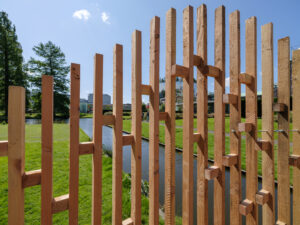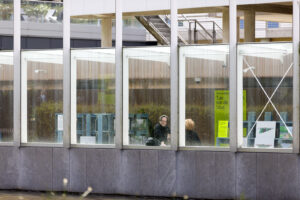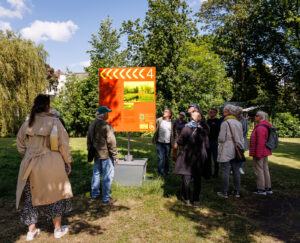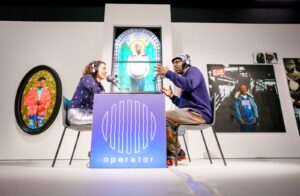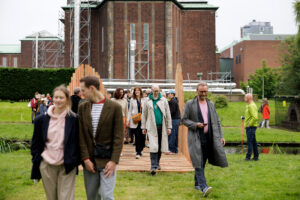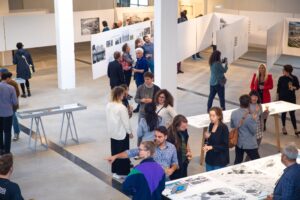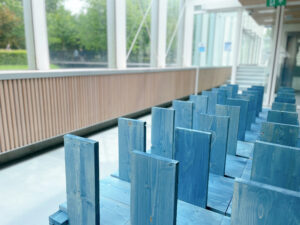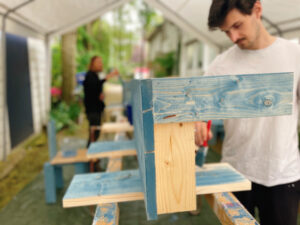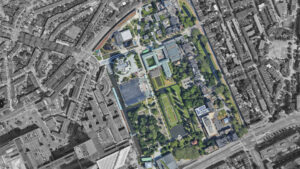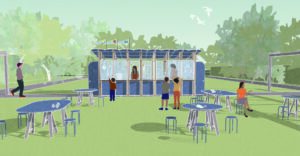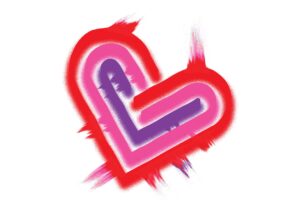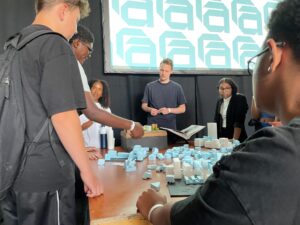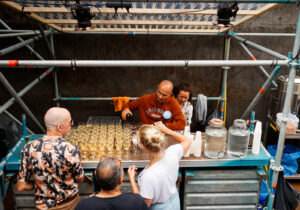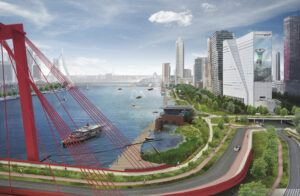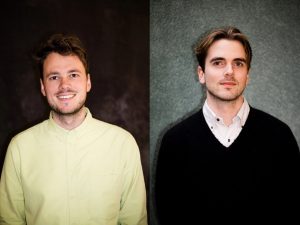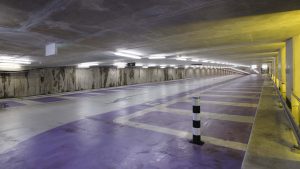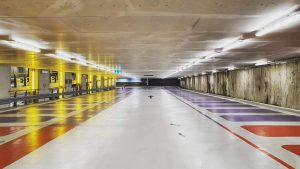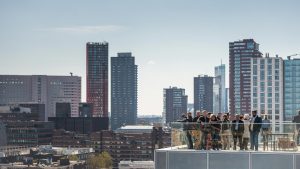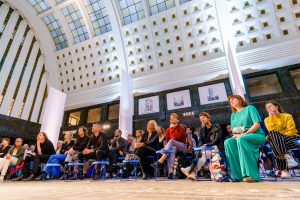News
Skating, walking and meeting on the water: a look ahead with AIR to Rotterdam Architecture Month 2023

Lindy Kuit
It’s almost time for Rotterdam Architecture Month again. This summer, the largest architecture festival in the Netherlands is coming to the south bank of the river Maas, with a floating festival heart in the middle of the Maashaven. Why that spot in particular? What is the theme of this edition? And what can we expect in terms of programming, both inside and outside the festival heart? A conversation with AIR’s entire programme team.
A floating festival heart. What exactly does that involve?
Manon van den Bliek: ‘Three huge floating barges that are connected to each other are coming to the Maashaven, but all three have different functions. Barge 1 will feature a green park that will also host lectures, debates, films and other events. Barge 2 is all about urban sports, like skateboarding and freerunning. And in barge 3, there is an outdoor exhibition on the opportunities and challenges of water in the city. On the basis of tangible objects, you will learn more about a dike park, African water cities and a micro city, among other things. You enter the floating festival heart via the Maassilo, and then follow the route across a footbridge. So, you can walk from barge to barge and enjoy the view over the water and the city as well.’

Floating Festival Heart Rotterdam Architecture Month © Studio Marco Vermeulen
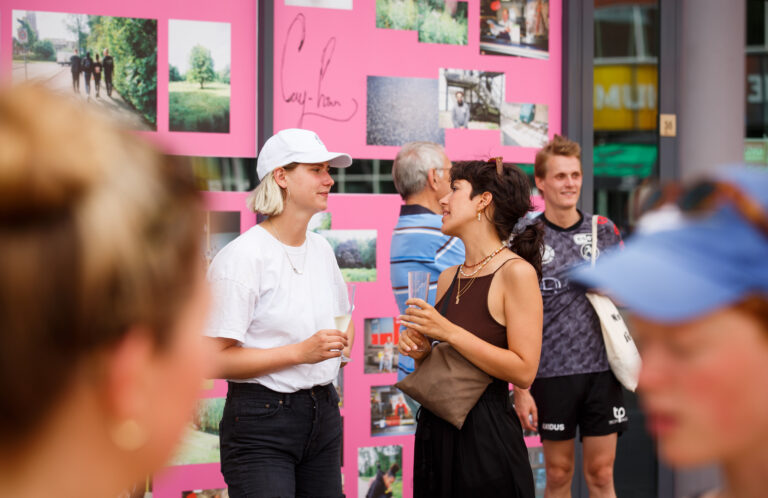
Rotterdam Architecture Month ’22. © Fred Ernst
Why is the festival heart floating specifically in the Maashaven?
Josien Kamp: ‘In the coming years, part of the Maashaven will be transformed into a brand-new city park, the Nelson Mandelapark. We want to pick up on that development, and others, with Rotterdam Architecture Month by using the floating festival heart as a kind of test site. The park will also have an Event space and room for urban sports, which is why we are also deliberately incorporating these functions into our festival heart.
Eva van Breugel: ‘The hard-paved quayside of the Maashaven is currently not a pleasant place to linger and, as a result, it is almost impossible to imagine what the Nelson Mandelapark could become. With the festival heart, we want to let people experience already what it’s like to be on the water, to walk there in the green surroundings, take part in sports or listen to a concert or symposium.’
Josien: ‘By no means everyone knows what is going to happen in the Maashaven. The festival heart is also a means of informing and involving people and giving them a say on the plans in their city.’
Barbara Luns: ‘The festival heart is a temporary intervention that is in line with Rotterdam Architecture Month’s ambition to bring large, abstract, spatial issues in the city closer to the public, in an approachable way. The Maashaven is going to change dramatically in the coming years. What does that mean for the living environment? And what role can this place play in the future, for all the different identities that Rotterdam has? We will be ‘practising’ all of that this summer.’
‘The floating festival heart is a means of informing residents and giving them a say on the plans in their city.’
Josien Kamp, AIR programme maker
The theme of Rotterdam Architecture Month this year is Natte Stad (Liquid City). Why was this theme chosen and what does it involve?
Eva: ‘Rotterdam has long been a port city, of course. That port is moving further and further away, making the city increasingly surrounded by and permeated with water. How can you turn all that water into public space as an important part of the urban fabric? Naturally, the new Nelson Mandelapark is a great example. In addition, the theme touches on other current and pressing issues such as climate change, sea-level rise, water storage, living in areas outside the dikes, biodiversity and much more.’
Manon: ‘In the low-threshold outdoor exhibition, designers, architects, artists and the municipality show how design can help us deal with water at different scales. Of course, those pressing issues Eva mentioned are not only playing out in Rotterdam. That is why the exhibition also looks at what is happening in the rest of the country, and even around the world.’
Jamie Hornis: ‘Our living environment is going to change in an extreme way in the next 100 years. It’s important that we bring people into this and involve them as much as possible.’

Tentoonstelling (T)Huis Rotterdam Architectuur Maand ’22. © Fred Ernst

Drijvend Festivalhart Rotterdam Architectuur Maand © Studio Marco Vermeulen
This year there is also a significant focus on urban sports. What are they and why are they important?
Tom Tomasowa: ‘By urban sports, we mean sports you do in public spaces, such as skateboarding, freerunning and callisthenics – a street workout where you train with your own body weight. Rotterdam has a very large group of urban athletes who do much more than just exercise outdoors; they bring places to life and have a great deal to offer a city. They deserve to be integrated into urban development.’
Lewis Ramos: ‘Urban sports will also have a place in the new Nelson Mandelapark. And since the festival heart is a sort of temporary test site, we needed to have a focus on sports, of course. The special urban-sports barge was designed by freerunner Onur Eren in collaboration with Studio Marco Vermeulen. It will be equipped with a mini ramp, a freerun parcours and a free space. For skaters and freerunners, but also for footballers and dancers, for example. It is really the intention that cross-pollination will happen between sports, and encounters between people.’
Tom: ‘In terms of the programme, we are still very much in talks with parties in the area, but we have at any rate sought collaboration with RUSH World and Skateland. Together with them, we will organize clinics, workshops and other events throughout the month of June in which everyone can participate. And on Go Skateboarding Day on 21 June, there will be a special Skate Symposium that addresses the value of urban sports for urban development.’
Josien: ‘The Skate Symposium is an in-depth programme in which we explore the importance of other visions and perspectives on public space. If we look at public space through the eyes of skaters and urban athletes, we think we can learn a lot from these perspectives. That is why we are inviting professional skater and ‘skate city planner’ Leo Valls from Bordeaux to reflect on the Rotterdam practice based on his experiences.’
Eva: ‘By organizing this symposium, we hope to inspire the city – and in particular the officials who are working on the city – to think in concrete terms about how we can use skating, among other things, in outdoor spaces as a instrument to achieve an enjoyable, lively and safe city.’
‘During Rotterdam Architecture Month,we celebrate Rotterdam as an architecture city.’
Barbara Luns, director AIR

Eva van Breugel en Lotte Wierikx tijdens het jongerenprogramma van de Rotterdam Architectuur Maand ’22. © Fred Ernst
Rotterdam Architecture Month 2023 will consist of around 125 events spread across more than 40 locations. How do you keep that clear and manageable for the visitors? And can you give us a sneak preview of the enormous programme?
Lotte Wierikx: ‘We have divided this year’s programme into three main components: weekend programming, youth programming and a professional element. The weekend programming includes the urban sports clinics Tom already mentioned. But also, for example, the film weekend taking place on 9 and 10 June in the festival heart’s event barge. Film lovers can enjoy a variety of films then in a unique setting, with AFFR and Powerhouse Company, among others, screening a film. On Sunday 4 June, the festival heart is all about the neighbourhood. Everyone living in Rotterdam South has free entry. You can follow the walking route then, look at the outdoor exhibition, attend workshops, and also see local artists perform. For the youth programming, we have collaborations with secondary schools, colleges and the IMC Weekend School Foundation. We are also organizing a youth programme on 18 June: Fresh Perspectives | Reclaim the City. How do young people view our city? In four different master classes from different design and art disciplines, they will create a blueprint of the city.’
Jamie: ‘And then there are the networking events and expert sessions for professionals in the field, which deal with the big, abstract design tasks.’
Eileen Stornebrink: ‘For instance, the symposium Women in Architecture, which stems from a publication of the same name by nai010. We celebrate the appearance of the publication, which is part of a series highlighting missing voices in architecture. With lectures, panels and interactive discussions, we will take a different look at these voices.’
Lotte: ‘Something else that is interesting to mention: in collaboration with N8W8, Rotterdam’s independent night council, we are organizing an evening dedicated to the night. What does nightlife mean for Rotterdam and how does urban development relate to the night?’

Open Bureaudag tijdens de Rotterdam Architectuur Maand’ 22. © Fred Ernst
Eileen: ‘There are, of course, the well-known events that return every year. For instance, Verborgen Tuinen (Hidden Gardens), the Day of Architecture, the presentation of the Rotterdam Architecture Prize and the Open Bureaudag (Open Office Day). During the Open Office Day on 24 June, Rotterdam design firms will open their doors and show the public what their design practice is like. We are organizing the day to introduce people to architecture, landscape architecture and urban design, but also to strengthen the mutual network of design firms. I would also like to mention the pop-up exhibition Re(dis)covering Ukraine at Flokk. Five Ukrainian makers who are also part of the Ukraine-Netherlands Urban Network (UNUN) will show here their research, perspective and/or project for the reconstruction of Ukraine.’
Josien: ‘The programme certainly does cover a great deal, but that also means there is something for everyone. Even if architecture is not your thing, there is always an event that is of interest to you.’
What feeling do you hope people who have visited Rotterdam Architecture Month return home with?
Barbara: ‘With the feeling of having celebrated Rotterdam together as an architecture city.’
Eva: ‘I hope that every visitor to Rotterdam Architecture Month knows a little bit more about the city afterwards.’
Tom: ‘And at the same time feels more connected to everything that is happening or going to happen in Rotterdam.’

Finissage Rotterdam Architectuur Maand ’22. © Fred Ernst

Over AIR
De Rotterdam Architectuur Maand is een initiatief van AIR – Architectuur Instituut Rotterdam, Rotterdam Festivals en Rotterdam Partners. AIR organiseert en faciliteert het festivalhart van de Rotterdam Architectuur Maand.
Bekijk hier het programma van de RA Maand

